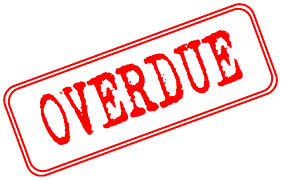The best way to avoid overdue accounts is to avoid dealing with another firm’s slow paying customers. Almost every customer that’s going to be a problem for you is already a problem for somebody else.
Does that mean never taking risks? Of course not. Every business has to take risks from time to time, and extending credit is always risky. Extending credit unwisely, however is just plain dangerous.
It’s difficult if not impossible to deal only with customers that have impeccable credit histories. It’s also true that some of the biggest and most financially-secure customers will be slow payers since they know they’re the bread-and-butter for their smaller suppliers.
Somehow you have to strike a balance between your cash flow requirements and the length of time you allow a customer to pay you. For whatever time your customers owe something but don’t pay you they’re operating on your money. Unless you’re a finance company your business isn’t there to lend money to other businesses.
Before you accept any new customers you owe it to yourself to give them a thorough credit check. The extent to which you go will naturally depend on the potential size of the account but you should never consider anyone a customer until you’ve ascertained that they can and will pay you.
Everyone wanting an account with your business should complete a credit application with references, and provide some kind of proof of their identity. If you don’t already have a credit application form there are several different examples downloadable from the internet to start the process.
Make this application a credit agreement between your business and theirs. State your payment terms in this document and ask that a legal representative of the other business signs it when it’s returned to you for checking.
Once you have the required information you can do some checking yourself or ask a professional firm to do it for you. If you use a specialist firm for the job you will have the benefits of their expertise and use of their own sources of credit histories that you usually won’t be able to access.
Customers who give you credit references are a bit like job applicants. They decide whom to give you as a referee and it’s highly unlikely they’ll give you anyone likely to reveal problems with their account. Ask for details about each referee including the goods purchased from them and the monthly volume of the purchases. Also ask what credit terms are applied by each referee.
Customers differ widely in the credit terms they require. The amounts of their accounts and the lengths of time for payment should be reflected in their value to your business.
A credit-based relationship should be built up slowly. Increase the amounts and the lengths of time for payment only gradually, once the customer has proven their ability at a lower level.
There are several other factors you should consider before extending credit to a new customer:
• In a booming economy it’s easier to find reasons for extending credit than when times are tough. Is the economy rising or falling?
• Some businesses trade in highly cyclical industries. Is your customer’s business about to enter a trough?
• Does the business buy similar products from several other suppliers? This could be an indication of the business staying with a supplier only until the trading relationship develops problems.
• Are the company’s assets free or are they encumbered?
• Can you afford the loss if the customer doesn’t pay you?
It’s always interesting to see how a new customer responds to a request for the first purchase to be handled as a C.O.D. transaction. If their reaction is one of fear or horror it could well be because they’re having problems elsewhere and hope you’ll help them with what amounts to an interest-free loan.
If your checks do turn up some indications that your applicant is a slow payer elsewhere, don’t expect them to change their behavior just for you. If you still decide to take them on you can count on spending time and perhaps some money as well to gather in what they owe you.
Eliminate disputes over when an account is actually due by printing the due date on every invoice. If a late payer claims to be unaware of when the payment was due you can then simply refer them to the invoice and ask for payment by that date (or immediately if the account is now past due).
You might also want to offer a discount for prompt payment — but once again be sure to put the due date on the invoice. History has shown that slow payers traditionally take any discounts on offer, even long after they’re due.
Be firm when enforcing your credit policy. If a customer’s payment is overdue let them know about it and ask when the money will be received. Tell them that until the amount is paid you won’t be able to do any more business with them. It’s not wise to agree on a C.O.D. basis for the next delivery or sale; that money should be applied to the outstanding amount.
Copyright 2004, RAN ONE Inc. All rights reserved. Reprinted with permission from www.ranone.com.

 Chris’ combination of academic credentials, career experience and temperament ideally suit his calling as a business development advisor. Clients say he has a mind for business and a heart for service.
Chris’ combination of academic credentials, career experience and temperament ideally suit his calling as a business development advisor. Clients say he has a mind for business and a heart for service.